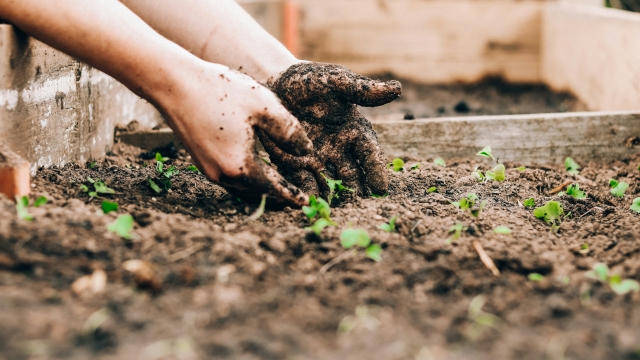
In the ever-evolving world of agriculture, the right farming products play a crucial role in maximizing crop yields and ensuring sustainable practices. Farmers today face numerous challenges, from unpredictable weather patterns to pest infestations, making it essential to select the most effective tools and inputs to bolster their harvests. Whether you’re a seasoned grower or just starting out, understanding the variety of farming products available can make a significant difference in your overall success.
From high-quality seeds to organic fertilizers and advanced irrigation systems, the options are plentiful. Each product serves a unique purpose and can be tailored to specific crops and growing conditions. By embracing innovative farming products, you can enhance soil health, improve plant resilience, and ultimately increase your productivity while contributing to a more sustainable agricultural future. Exploring these products not only empowers farmers to achieve their goals but also supports the growing global demand for food security.
Essential Farming Products
Farming products play a crucial role in ensuring successful agricultural practices. From seeds to fertilizers, each product contributes to healthy plant growth and maximizes yield. Farmers must choose high-quality seeds that are suitable for their specific climate and soil conditions. The right seed variety can make a significant difference in the overall harvest and resilience against pests and diseases.
Fertilizers are another essential component of farming products. They provide necessary nutrients that crops need to thrive. Organic fertilizers, such as compost and manure, enhance soil health and promote sustainable farming practices. Synthetic fertilizers can be tailored to supply specific nutrient deficiencies in the soil, allowing farmers to optimize their crops’ growth potential. Understanding the nutrient needs of various crops is vital for selecting appropriate fertilizers.
Crop protection products are equally important in maintaining healthy farms. These include pesticides, herbicides, and fungicides that help protect crops from pests and diseases. Integrated pest management strategies can effectively reduce the need for chemical treatments, promoting a healthier ecosystem. Employing these products responsibly ensures that farmers can safeguard their harvests while also considering environmental impact.
Choosing the Right Tools
Selecting the right tools is crucial for optimizing farming productivity. Each farming product serves a specific purpose, and understanding these roles can help farmers make informed choices that enhance their efficiency. From hand tools like shovels and trowels to larger machinery such as tractors and harvesters, having the appropriate tools at hand allows for better management of tasks and resources.
Investing in quality equipment can lead to significant long-term benefits. While it may require an initial financial outlay, durable tools will often save money over time through increased productivity and reduced maintenance costs. Additionally, features such as ergonomics and ease of use contribute to a more pleasant working experience, which can positively impact work output and efficiency on the farm.
Farmers should also consider the specific needs of their crops and the type of land they’re working on when choosing farming products. For instance, tools designed for small-scale gardens differ vastly from those suitable for large agricultural operations. By matching tools with farming goals and environmental conditions, farmers can ensure they are equipped to achieve maximum harvests.
Innovative Technologies in Farming
The agricultural landscape has been transformed in recent years by innovative technologies that enhance efficiency and productivity. Precision agriculture is at the forefront, utilizing GPS and IoT sensors to monitor crop health and soil conditions in real time. This data-driven approach enables farmers to apply resources such as water, fertilizers, and pesticides more effectively, resulting in higher yields and reduced waste. By harnessing technology, farmers can make informed decisions that lead to sustainable practices and increased profits.
Another significant advancement is the integration of automation and robotics into farming operations. Automated machinery, such as drones for aerial imaging and robotic harvesters, streamline various processes that were once labor-intensive. Drones, equipped with advanced imaging technology, allow farmers to assess crop health and identify problem areas in a fraction of the time it would take manual inspections. With robots handling tasks like planting and harvesting, farmers can focus on strategic planning and management, further maximizing the output of their lands.
Biotechnology also plays a crucial role in advancing farming products. Genetic engineering has led to the development of crops that are more resistant to pests, diseases, and environmental stresses. These genetically modified organisms (GMOs) not only promise higher yields but also contribute to food security in the face of growing global populations and changing climates. By embracing these innovative techniques, farmers can cultivate crops that thrive in diverse conditions while minimizing environmental impact and ensuring sustainability for future generations.
Sustainable Practices for Maximum Yield
Sustainable farming practices are essential for maximizing harvests while preserving the environment. Crop rotation, for instance, helps maintain soil fertility and prevent pest buildup. By alternating different crops in a given field, farmers can enhance the nutrient profile of the soil and reduce dependence on synthetic fertilizers and pesticides. This technique not only boosts yields but also promotes biodiversity, leading to healthier ecosystems.
Another effective strategy is the implementation of integrated pest management (IPM). This approach combines various practices such as biological control, habitat manipulation, and resistant crop varieties to manage pest populations sustainably. By focusing on natural pest control methods rather than solely relying on chemical treatments, farmers can protect their crops while minimizing adverse impacts on the environment. This results in healthier harvests and stronger ecosystems that support agricultural resilience.
Water conservation techniques also play a crucial role in sustainable farming. Implementing drip irrigation systems and rainwater harvesting can significantly reduce water usage while ensuring that crops receive adequate moisture throughout their growth cycle. These methods not only enhance yield but also mitigate the risk of drought and other climate-related challenges. By adopting these sustainable practices, farmers can achieve maximum yields while fostering a more sustainable and productive agricultural landscape.
